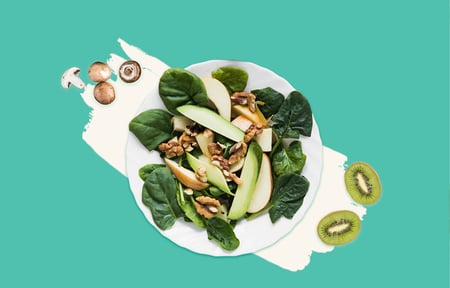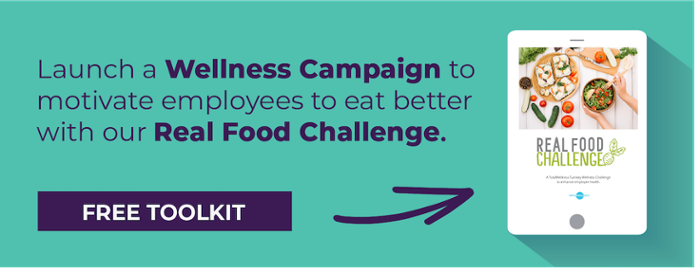 When you think of a plant-based diet, what comes to mind?
When you think of a plant-based diet, what comes to mind?
Tofu? Hippies? Grazing on the plants in your front yard?
While there may be a lot of misconceptions about what a plant-based diet looks like, one thing is crystal clear: Research shows it can supercharge your health. Eating a whole foods diet centered on plants brings about perks like weight loss, lowered blood pressure, and more.
Best of all, it’s not an all-or-nothing lifestyle. You can make the diet fit your personal needs. If you prefer plants to pills to heal your ailments, then a plant-based diet may be for you.
In this post, we detail plant-based diet benefits, plant-based foods to avoid, and how a plant-based diet isn’t as restrictive as you think.
Ready to learn how to heal your gut with food?
What is a Healthy Plant-Based Diet?
This diet is one that most followers think of as more of a lifestyle. On a plant-based diet, you’ll increase whole grain consumption, eat minimally processed foods, and prepare your own legumes, for example. You might also eliminate or reduce animal products.
The basic guidelines of a plant-based diet:
- Food quality is of utmost importance
- Added sugar is nixed
- Eliminates refined foods like white flour
- Reduces animal products (meat, butter, milk, etc.)
- Use of fresh or frozen fruits and veggies
Perhaps one of the most exciting parts of this lifestyle is that you don’t have to go completely vegan or vegetarian. If you decide to eliminate all animal products, you’ll want to ensure you’re getting enough protein.
Why Switch to a Plant-Based Diet?
For years, research has backed the scientific claims that a plant-based diet can do a body good. And when you consider that obesity and diabetes are described as pandemics in America, it’s no wonder why more physicians are recommending a plant-centered lifestyle.
Plant-Based Diet Benefits
Luckily, if you plan to give up your everyday steaks, there are a ton of big health benefits waiting for you. Not only can a plant-based diet lower your risk for chronic diseases, but it may shrink your waistline, too.
Here’s a look at some of the top plant-based diet benefits:
- Serious medical conditions reversed - Conditions like heart disease have been reversed by plant-based diets. Another new study revealed that significant diet changes and persistence can help individuals potentially reverse type 2 diabetes.
- Reduces overall inflammation - This diet seems to reduce the body’s inflammation levels. A good thing since chronic inflammation can lead to cancer and heart disease.
- Shrinks the waistline - Research shows folks who are overweight who eat a plant-based diet can lose weight. It can also work as a prevention and treatment option for those who are at risk of obesity.
- Improves the gut microbiome - Assists the digestive tract and the immune system.
On the other side of the spectrum, plenty of studies show a bad diet leads to poor health. In 2017, The Journal of the American Medical Association published a study that found “Suboptimal intake of specific foods and nutrients was associated with a substantial proportion of deaths due to heart disease, stroke, or type 2 diabetes.”
How Not to Do a Plant-Based Diet
Marketing practices in the food world can be intriguing but misleading, especially for folks who don’t read nutritional labels for a living.
Believe it or not, not all plant-based foods are healthy.
Over-processing takes away the nutritional value of a lot of foods that might normally be nutritious when left alone in nature. It can be easy to get sucked into the bright marketing ploys and “healthy” word choices printed on foods. The term low-fat usually means sugar was added in its place, which can make pre-packaged plant-based options high in sugar content.
Some of the most common offenders:
- Crackers
- Potato chips
- White bread
- Pasta sauce
- Pre-seasoned rice
These are technically “plant-based foods” but aren’t healthy due to processing during packaging. Next time you go to buy your pasta sauce, check out the sugar content. You might be better off making your own!
Convenient “plant-based foods” that aren’t healthy? It’s best to avoid:
- Canned veggies
- Processed nuts
- Canned legumes
- Canned fruits
These items can be high in sodium and sugar, unfortunately. Instead, opt for frozen veggies or dried legumes or beans you cook yourself. Fruits are best fresh or frozen, too. As for nuts, unsalted options offer nutrients without the high salt levels.
Another sneaky but delicious one that’s marketed for its vitamin C content? Fruit juices. These processed beverages can be high in calories thanks to the added sugar. Reach for an actual fruit instead to get the fiber and full nutrient benefits.
Going Shopping? Here’s a Plant-Based Food List
One way to ensure you’re putting only the best foods in your shopping cart is by shopping the perimeter of your grocery store. Most of the snacks and junk foods are in the middle aisles. Heading to the store with a plant-based diet food list will make your shopping a lot easier, too!
Instead, try and put these items in your cart:
Fruits: Berries, citrus fruits, pears, nectarines, pineapple, cherries etc.
Veggies: Spinach, squash, broccoli, leeks, carrots, asparagus, peppers, etc.
Healthy fats: Avocados, almonds, olive oil, coconut oil, etc.
Legumes: Peas, lentils, peanuts, chickpeas, black beans, etc.
Plant-based protein: Tofu, tempeh, and protein shakes without added sugar
Whole grains: Brown rice, quinoa, brown rice pasta, barley, etc.
A trip to your local farmer’s market is a great opportunity to find local produce that’s bright, healthy, and fresh. You can also talk to the grower and ask questions about how to best cook your farmer’s market veggie haul!
Start Small With Diet Changes
Making even small changes to your diet can have benefits. Switching your mindset and paying attention to how you feel can be incentive enough to keep up a healthy lifestyle like a plant-based diet.
Above all, remember:
A healthy diet should be a lifestyle, not a fad or a temporary diet. When you make small daily changes, it has a positive compounding impact on your heart, immune system, and gut!
What Were You Saying About My Gut?
If you’re interested in reducing your risk of cardiovascular disease and improving your gut health, there’s another diet you might want to consider, too. It may feel less restrictive than a plant-based lifestyle.
Enter the Mediterranean Diet.
This diet — which incorporates the cooking styles of the Mediterranean along with healthy eating — can pave the way for entering into a plant-based diet.
It’s also recommended by the Dietary Guidelines for Americans to prevent chronic diseases.
The focus of a Mediterranean Diet is on eating plenty of vegetables, fruits, whole grains, and healthy fats. Weekly meals of fish, beans, poultry, and eggs is also encouraged.
Like a plant-based diet, the Mediterranean diet supports a healthy microbiome in the digestive tract, which often leads to weight loss and better overall health.
Studies show overly-processed diets cause imbalances in the intestinal tract, causing pain and other issues like irritable bowel syndrome, weaker immune systems, and possibly support cancer cell formation.
Other studies have shown increases in gut health by following a vegan diet can occur in as little as four months.
Get Back to Basics
If you’re considering healing your gut after an indulgent holiday season, a plant-based diet is a perfect way to do it.
Or, if you’re suffering from a chronic disease like diabetes, it can be worth a shot. Just make sure you talk to your doctor or a dietician first.
Eating a plant-based diet doesn’t mean you have to suffer and miss out on your favorite foods. It also doesn’t have to be super expensive, either. Since you’ll be likely eating less meat, you will have more funds to put toward quality produce.
Even if you don’t go full force into a plant-based diet, reducing meat and dairy while including more whole foods can promote health while not feeling too restrictive.
The longer you do it, the better you’ll feel. Sometimes that trade-off is enough to continue on the plant-based eating journey.
Want more energy? Check out our list of 52 Energy Boosters for Every Week of the Year to get through your day feeling naturally energized and ready to tackle any project that comes your way.



